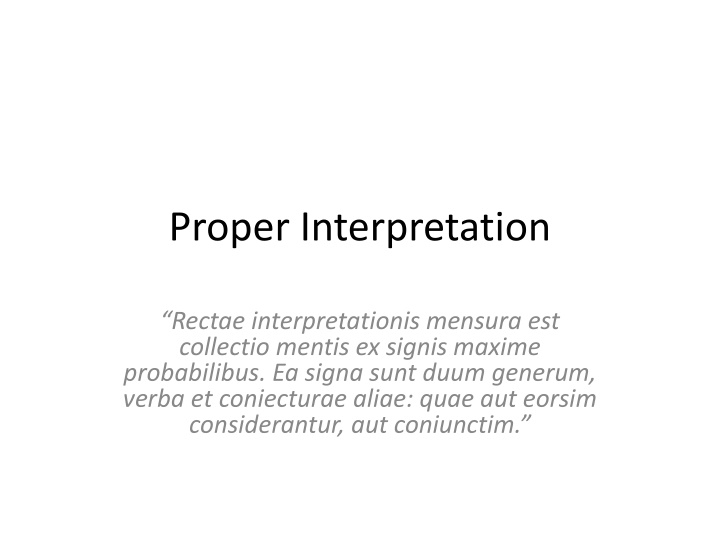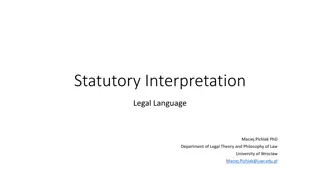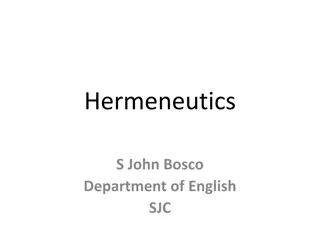Challenges of Uniform Interpretation in the CISG
The CISG, widely accepted among trading nations, faces challenges in uniform interpretation across member states. With over two-thirds of international trade represented by parties to the convention, the issue of varied interpretations arises, despite provisions for uniformity in Article 7. The potential affliction of divergent interpretations may hinder the intended unification and harmonization of international sales of goods. The crucial question remains: Have the spiritual fathers of the Convention truly achieved their goal?
Uploaded on Sep 23, 2024 | 2 Views
Download Presentation

Please find below an Image/Link to download the presentation.
The content on the website is provided AS IS for your information and personal use only. It may not be sold, licensed, or shared on other websites without obtaining consent from the author.If you encounter any issues during the download, it is possible that the publisher has removed the file from their server.
You are allowed to download the files provided on this website for personal or commercial use, subject to the condition that they are used lawfully. All files are the property of their respective owners.
The content on the website is provided AS IS for your information and personal use only. It may not be sold, licensed, or shared on other websites without obtaining consent from the author.
E N D
Presentation Transcript
Proper Interpretation Rectae interpretationis mensura est collectio mentis ex signis maxime probabilibus. Ea signa sunt duum generum, verba et coniecturae aliae: quae aut eorsim considerantur, aut coniunctim.
. Benchmark of proper interpretation is to mention purpose from the most probably indications. These indications are of two kinds, words and consequences: and these are considered either separately or jointly.
CISG CISG is broadly accepted among the states and nowadays the most important trading nations (around 84) are party to it. In a fact they represent more than two-thirds of international trade. The only UK, India and couple of other important trading nations are not parties to the Convention.
CISG and its applicability The CISG is directly applicable to international sales of goods in those States, unless the parties to the contract exclude its application.
CISG and its Interpretation Direct applicability of CISG brings one quite a crucial problem. Do courts in the states that are parties to the Convention interpret it in the same way, or do they interpret it differently.
CISGs Affliction CISG is international Convention and it can possibly suffer from the same affliction as international law in general. We can sometimes see it in the international law. One legal order common to all states, mostly agreed upon by them, but possibly with 200 different interpretations when it comes to problem. We have only 84 in CISG, but still
Parole, parole, parole? Have the spiritual fathers of the Convention really succeeded in unification and harmonization international sales of goods or not?
How does the CISG deal with uniform interpretation? It is quite clear that drafters were aware of the issue and that is why they have provided possible solution in Article 7
Article 7(1) CISG In the interpretation of this Convention, regard is to be had to its international character and to the need to promote uniformity in its application and the observance of good faith in international trade.
Article 7(2) CISG (2) Questions concerning matters governed by this Convention which are not expressly settled in it are to be settled in conformity with the general principles on which it is based or, in the absence of such principles, in conformity with the law applicable by virtue of the rules of private international law.
Is such a wording sufficient? Does the reference to the international character mean, that the courts and arbitrators have to resort to the Vienna Convention on the Law of Treaties interpretative provisions anchored in Articles 31-33?
It is an international treaty, at the end, referring to the good faith as well, state courts are organs of the State, the VCLT is binding on them
Do we all agree with the statement below? Upon adoption of the CISG by a State, Article 7 becomes part of the law of that State and constitutes a direction to the courts as to how to interpret the Convention. Nevertheless, it is understandable that the judges, trained in the law of their own domestic legal system, will have a home-State bias when faced with the need to interpret and apply the Convention. Furthermore, to promote uniformity in its application the judge must know how the Convention has been interpreted in the other States that have adopted it. That is not easy for obvious reasons.
Yes, but. We generally agree, but I am not quite sure, whether and to what extent can Article 7 constitute a direction to the courts as to how to interpret the Convention, since it is rather vague.
Proper Interpretation is the crucial issue Uniform law, by definition, calls for its common interpretation in different legal systems that have adopted it. The CISG is an important legal document, because it establishes a uniform code of legal rules governing the formation of contracts for the international sale of goods, the obligations of the buyer and seller, remedies for breach of contract, and other aspects of the contract. As stated in its Preamble, the CISG was created to remove legal barriers in international trade and promote the development of international trade. For the Convention to accomplish its objectives, it is essential that its provisions are interpreted properly.
Agreed The CISG is uniform law binding buyers and sellers from different legal cultures to its set of rules and principles. Uniformity in the Convention s application, however, is not guaranteed by the mere adoption or ratification of the CISG. The political act of adoption of the Convention by different sovereign States is merely the necessary preliminary step toward the ultimate goal of unification of the law governing contracts for the international sale of goods.
Agreed The long process of unification of international sales law can be completed only in practice if the CISG is interpreted in a consistent manner in all legal systems that have adopted it. In contrast, if domestic courts and tribunals introduce divergent textual interpretations of the CISG, this uniform law will be short-lived.
Built-In Interpretative Rules and Standards? It is natural that disputes will arise as to the meaning and application of the CISG s provisions. The CISG, however, comes with its own, in-built interpretation rules, which are set forth in Article 7. Article 7 is the provision that sets forth the Convention s interpretative standards. The provision in Art. 7(1) expressly prescribes the international character of the Convention and uniform direction that should be adopted in the interpretation and application of its provisions.
Unique Nature, Autonomous, Self- Contained Owing to its unique nature as an autonomous and self-contained body of law, it is necessary that CISG exist on top of a legal order that can provide doctrinal support and solutions to practical problems such as resolving issues that are governed but not expressly settled by the Convention, as per the gap-filling pro- visions in Art. 7(2). This doctrinal support guarantees CISG s functional continuity and development without offending its values of internationality and uniformity mandated in Art. 7(1).
If the above statements applied, why would we need UNIDROIT principles, PECL, etc.? An interpretive approach that has been suggested as suitable to the proper application of the CISG as truly global uniform sales law is based on the concept of internationality and on generally acknowledged principles of commercial law, such as the UNIDROIT Principles and the Principles of European Contract Law (PECL).
Even More Confusion Are UNIDROIT Principles and PECL identical?
How about Article 7(2) Is the textual reference in Article 7(2) CISG to private international law a positive step toward substantive legal uniformity?
Once again Paragraph (1) of Article 7 mandates that in the interpretation of the Convention one must pay close attention to three points: (a) the international character of the CISG, (b) the need to promote uniformity in its application, and (c) the observance of good faith in international trade.
Everybody understands? It is the opinion of many scholars that the first two of these points are not independent of each other, but that, in fact, the second is a logical consequence of the first. The third point is of a rather special nature, and its placement in the main interpretation provision of the CISG has caused a lot of argument as to its precise meaning and scope.
True Every legislative instrument raises issues of interpretation as to the precise meaning of its provisions, even within the confines of a national legal system. Such problems are more prevalent when the subject has been drafted at an international level.
Interpretation of domestic legislation In the interpretation of domestic legislation, reliance can be placed on methods of interpretation and established principles within a particular legal system the legal culture or infrastructure upon which the particular legislation is seated.
And how about CISG? interpretation becomes far more uncertain and problematic because there is no equivalent international legal infrastructure.
Bit messy, isnt it? Principles of interpretation could be borrowed from the law of the forum or the law that according to the rules of private international law would have been applicable in the absence of the uniform law. Either approach would result in a diverse construction and implementation of the same piece of legislation by different Contracting States.
No Doubt Such a result would undermine the purpose of the uniform legislation and defeat the reasons for its existence.
Is the situation that bad? What follows is short insight into the Czech Civil Code Interpretative Provisions.
Interpretation under the Czech Civil Code (Act No. 89/2012 CoL) Section 2 (1) Each provision of private law may be interpreted only (a) in accordance with the Charter of Fundamental Rights and Freedoms and the constitutional order in general, (b) the principles underlying this Act, and (c) considering at all times the values that it protects. Should the interpretation of a provision diverge from this imperative solely on the basis of its wording, the imperative prevails.
Constitutionally Conforming Interpretation While provision of Section 2(1) tells us that the interpretation has to respect overall constitutional framework and has to be done in in conformity with constitutional acts. In the Czech Republic it also means that because of relevant provisions of Czech Constitution, namely of provisions of Article 10 of the Constitution that deal with international law, namely international treaties, the treaties that are approved, by the Parliament, ratified by the President, promulgated in official gazette, that are binding on the Czech Republic and are directly applicable, Are part of the Czech legal order and have priority in application over municipal legal acts.
ARTICLE 1 (1) The Czech Republic is a sovereign, unitary, and democratic state governed by the rule of law, founded on respect for the rights and freedoms of man and of citizens. (2) The Czech Republic shall observe its obligations resulting from international law.
ARTICLE 10 Promulgated treaties, to the ratification of which Parliament has given its consent and by which the Czech Republic is bound, form a part of the legal order; if a treaty provides something other than that which a statute provides, the treaty shall apply.
ARTICLE 95 (1) In making their decisions, judges are bound by statutes and treaties which form a part of the legal order; they are authorized to judge whether enactments other than statutes are in conformity with statutes or with such treaties. (2) Should a court come to the conclusion that a statute which should be applied in the resolution of a matter is in conflict with the constitutional order, it shall submit the matter to the Constitutional Court.
Priority is given To CISG and also to its Article 7 under the Czech Law CISG is this kind of treaty and given it meets all other conditions, it is directly applicable with the priority over the Czech legal acts.
Civil Code Section 2(2) Section 2(2) states, what is a logical way of interpreting Civil Code and in fact, it attempts to give priority to the so teleological interpretation (considering object and purpose.)
Global Interpretative Standards adopted by Czech Civil Code (2) Statutory provisions may not be given a meaning other than that which follows from the actual sense of the words grammatical interpretation in their mutual context contextual interpretation and from the evident intention of the legislature; teleological interpretation (subjective and historical)
however, no one may invoke the wording of a legal regulation contrary to its sense. I am not sure how to understand the last sentence of Section 2(2). In a fact, the best way, how to understand telos (object and purpose) is to read clear and understandable legal text.
Good Faith is also present (3) The interpretation and application of a legal regulation must not be contrary to good morals and must not lead to cruelty or inconsiderate behaviour offensive to ordinary human feelings.
What is good faith? Legal principle? Meta-legal element and not the principle? Who knows? How about CISG?
Even more Acting bad faith (mala fide) is not necessarily reason of the invalidity of an act.
What else we have in Civil Code? Interpretation of juridical acts Section 555 (1) A juridical act is assessed according to its content. (2) If a certain juridical act is intended to obscure another juridical act, the former is assessed according to its true nature.
Intention of the parties and venire contra factum proprium Section 556 (1) What is expressed by words or otherwise is interpreted according to the intention of the acting person if the other party was aware or must have known of such an intention. If the intention of the acting person cannot be ascertained, the expression of will is attributed the same meaning which would be typically attributed by a person in the position of the person against whom the will was expressed. (2) When interpreting the expression of will, account is taken of the regular dealings of parties in legal transactions, what preceded the juridical act, as well as the manner in which the parties subsequently demonstrated what content and relevance they attach to the juridical act.
contra proferentem Section 557 If a term is used which allows various interpretations, in the case of doubt it is to be interpreted to the detriment of the person who used the term first.
Meaning customarily used and business usages Section 558 (1) In legal transactions with an entrepreneur, a term allowing different interpretations is attributed the meaning customarily used in such transactions. However, if the other party is not an entrepreneur, the person who invokes the meaning must demonstrate that the other party must have been aware of it. (2) In legal transactions among entrepreneurs, account is taken of business usages maintained in general or in a given industry, unless excluded by an agreement between the parties or by a statute. Unless otherwise agreed, a business usage is conclusively presumed to take precedence over non-compelling provisions of a statute; otherwise, an entrepreneur may invoke a usage if he proves that the other party must have known a given usage and was aware that it would be followed.
What is the Difference? Are the Czech Interpretative Standards, as anchored in Civil Code that distinct from CISG Standards?
Where is the Problem [E]ven when outward uniformity is achieved, . . . , uniform application of the agreed rules is by no means guaranteed, as in practice different countries almost inevitably come to put different interpretations upon the same enacted words.
Different autonomous interpretations [H]ow [does one] determine which interpretation should be preferred when the CISG itself gives rise to different autonomous interpretations [?]























